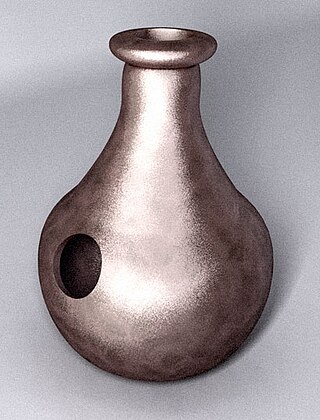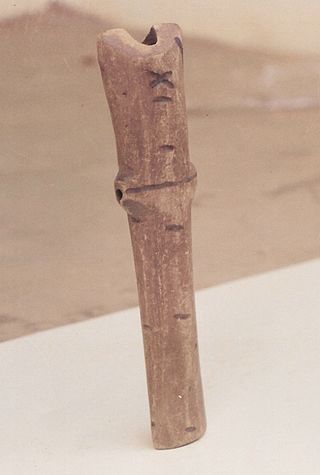
Highlife is a music genre that started in West Africa, along the coastal cities of present-day Ghana in the 19th century, during its history as a colony of the British and through its trade routes in coastal areas. It describes multiple local fusions of African metre and western jazz melodies. It uses the melodic and main rhythmic structures of traditional African music, but is typically played with Western instruments. Highlife is characterized by jazzy horns and guitars which lead the band and its use of the two-finger plucking guitar style that is typical of African music. Recently it has acquired an uptempo, synth-driven sound.
Makossa is a music genre originating in Douala, Littoral Region, French Cameroons in the late 19th century. Like much other music of Sub-Saharan Africa, it uses strong electric bass rhythms and prominent brass. Makossa uses guitar accompaniments, in the forms of solo and rhythm guitar, with a main singer and a choir of backup singers, with the focus being on the texture of the guitar, the role it plays in the song, the relationship between it and other instruments, the lyrical content and languages sung as well as their relationship with the music, the uses of various percussion instruments, including the bottle, the groove of the bass as well as the drums, and the use of technical knowledge and microprocessors to make the music. It is in common time (4/4) for the vast majority of cases. Language-wise, it is typically sung in French, Duala or Pidgin English. Tempo-wise, it is typically in between 130 and 170 BPM. It traditionally consisted of guitar-picking techniques that borrows from bikutsi; with a guitar-structure of a guitar switching from solo to rhythm from assiko; supplanted with complex bass grooves, and gradually picked up on brass section, from funk and later in the 70s, string section, from disco. It along with this acquired the sebene from Congolese rumba. In the 1980s makossa had a wave of mainstream success across Africa and to a lesser extent abroad. It is considered to be one of the greatest Cameroonian and even African "adventures" as a music.

The music of Nigeria includes many kinds of folk and popular music. Little of the country's music history prior to European contact has been preserved, although bronze carvings dating back to the 16th and 17th centuries have been found depicting musicians and their instruments. The country's most internationally renowned genres are Indigenous, Apala, Aurrebbe music, Rara music, Were music, Ogene, Fuji, Jùjú, Afrobeat, Afrobeats, Igbo highlife, Afro-juju, Waka, Igbo rap, Gospel, and Yo-pop. Styles of folk music are related to the over 250 ethnic groups in the country, each with their own techniques, instruments, and songs. The largest ethnic groups are the Igbo, Hausa and Yoruba. Traditional music from Nigeria and throughout Africa is often functional; in other words, it is performed to mark a ritual such as the wedding or funeral and not to achieve artistic goals. Although some Nigerians, especially children and the elderly, play instruments for their own amusement, solo performance is otherwise rare. Music is closely linked to agriculture, and there are restrictions on, for example, which instruments can be played during different parts of the planting season.

Congolese music is one of the most influential music forms of the African continent. Since the 1930s, Congolese musicians have had a huge impact on the African musical scene and elsewhere. Many contemporary genres of music, such as Kenyan Benga and Colombian Champeta, have been heavily influenced by Congolese music. In 2021, Congolese rumba joined other living traditions such as Jamaican reggae music and Cuban rumba on UNESCO's "intangible cultural heritage of humanity" list.

The music of the Cameroon includes diverse traditional and modern musical genres. The best-known contemporary genre is makossa, a popular style that has gained fans across Africa, and its related dance craze bikutsi.
Palm-wine music is a West African musical genre. It evolved among the Kru people of Liberia and Sierra Leone, who used Portuguese guitars brought by sailors, combining local melodies and rhythms with Trinidadian calypso to create a "light, easy, lilting style". It would initially work its way inland where it would adopt a more traditional style than what was played in coastal areas.

African popular music, like African traditional music, is vast and varied. Most contemporary genres of African popular music build on cross-pollination with Western popular music. Many genres of popular music like blues, jazz, salsa, zouk, and rumba derive to varying degrees on musical traditions from Africa, taken to the Americas by enslaved Africans. These rhythms and sounds have subsequently been adapted by newer genres like rock, and rhythm and blues. Likewise, African popular music has adopted elements, particularly the musical instruments and recording studio techniques of the Western music industry. The term does not refer to a specific style or sound but is used as a general term for African popular music.
Afro rock is a style of rock music with African influences. Afro rock is a dynamic interplay between Western rock music and African musical elements such as rhythm, melodies and instrumentation. Afro rock bands and artists in the late 1960s and early 1970s included Osibisa, Assagai and Lafayette Afro Rock Band.

Igbo music is the music of the Igbo people, who are indigenous to the southeastern part of Nigeria. The Igbo traditionally rely heavily on percussion instruments such as the drum and the gong, which are popular because of their innate ability to provide a diverse array of tempo, sound, and pitch. Igbo music is generally lively, upbeat, and spontaneous which creates a variety of sounds that enables the Igbo people to incorporate music into almost all the facets of their daily lives. Some very popular Igbo musical styles are Igbo highlife, Ogene, Igbo gospel.

Ogene is a style of Igbo music consisting of, and taking its name from, the ogene instrument, which is a large metal bell. The Ogene instrument has historically been made by the Igbo people of Nigeria. It is one of the most important metal instruments of the people.

Chief Stephen Osita Osadebe, often referred to as just Osita Osadebe, was a Nigerian highlife musician from Atani. During his career spanning over four decades, he became one of the best known musicians of Igbo highlife. His best-known hit was the 1984 single "Osondi Owendi", which established him as a leader in the highlife genre and was one of Nigeria's most popular records ever.
Igbo culture are the customs, practices and traditions of the Igbo people of southeastern Nigeria. It consists of ancient practices as well as new concepts added into the Igbo culture either by cultural evolution or by outside influence. These customs and traditions include the Igbo people's visual art, music and dance forms, as well as their attire, cuisine and language dialects. Because of their various subgroups, the variety of their culture is heightened further.
Igbo highlife is a contemporary musical genre which combines highlife and Igbo traditional music. It first started off in the southeast region of Nigeria, during the 1920s. The genre is primarily guitar-based music, with a rare characteristic blend of horns and vocal rhythms. Igbo highlife lyrics are sung mostly in Igbo with occasional infusion of Pidgin English. One of the most influential composers and performers of the music is Chief Stephen Osita Osadebe whose career spanned over 40 years. Osadebe's discography comprises numerous popular songs including the 1984 hit "Osondi Owendi" which launched him on the world stage as a pioneer of the Igbo highlife genre.
Indigenous Nigerian music is the music originating from the various indigenous tribes of Nigeria. It encompasses mainly traditional music styles, although some forms have absorbed partial influences from genres performed by immigrant and foreign musicians.

Orlando Julius Aremu Olusanya Ekemode, known professionally as Orlando Julius or Orlando Julius Ekemode was a Nigerian saxophonist, singer, bandleader, and songwriter closely associated with afrobeat music.
Cape Coast Sugar Babies was one of the first highlife orchestras from Cape Coast.They were also known as the Light Orchestra. Their style of music is known as West African Highlife music.
Ghanaian highlife emerged in the 1980s as a mixture of West African rhythms from Europe by Black people from south and North America. There were three forms of Ghanaian highlife:

The ọjà is an integral part of the rich cultural heritage of the Igbo people and continues to play a significant role in their musical traditions. The Igbo people, who are indigenous to Nigeria, are renowned for the utilization of the ọjà (flute) traditional musical instrument in cultural activities or events. It is made from bamboo or metal and is played by blowing air into one end while covering and uncovering holes along the body to create different notes. The ọjà, which is skillfully carved from wood, produces a beautiful sound when played during songs. In traditional Igbo music, the ọjà is often performed in conjunction with a number of other instruments such as the ekwe, udu, igba (drum), ogene (bell), ichaka/0sha (rattle), okwa (gong), etc. These instruments complement each other to create a unique and distinct sound that characterizes the musical traditions of the Igbo people. The seamless integration of these instruments in musical performances highlights the strong musical heritage and cultural identity of the Igbo people.

Ejike Benedict Obiano known professionally as Ejyk Nwamba or Ogene master, is a Nigerian musician from Anambra State. One of the front men in Ogene music, a musical style which is popular in the Eastern part of Nigeria, Nwamba is regarded as the best Ogene musician in Igboland. He is the recipient of several accolades, including Artist of the Year at the 2021 Ukpor Special Awards and Best Indigenous Artist of the Year at the 2022 Anambra Legends Achievers Awards.










